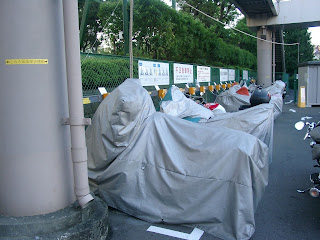Newly elected Prime Minister Taro Aso is notorious for getting himself in trouble with ill-considered remarks that manage to irritate or insult large segments of the Japanese population and neighboring countries' citizens as well. In a classic example of the "birds of a feather" adage, and in what may be a record for speed, one of the ministers he selected when he formed his cabinet last Tuesday--Land, Infrastructure, Transport and Tourism Minister Nariaki Nakayama--has had to resign from his post after making a series of gaffes, including one in which he called the nation’s biggest schoolteachers’ union "a cancer".
Opposition party leaders are of course delighted, saying the resignation is a ‘‘natural outcome’’ and promising to demand that Aso take responsibility for appointing Nakayama to his cabinet.
Amazingly, the series of controversial remarks Nakayama made in the few days since his appointment have drawn intense criticism not only from opposition parties but even from the ruling parties.
The (opposition) DPJ’s Ozawa said Saturday that Nakayama’s remarks ‘‘lack insight and are imprudent and unfair’’, and questioned--quite rightly in my opinion-- his qualification to be a state minister.
A senior member of the New Komeito party, junior coalition partner of the ruling Liberal Democratic Party, called for Nakayama’s early resignation, saying the issue should be resolved before Aso makes a policy speech at the Diet on Monday.
Nakayama did indeed resign early Sunday, having told reporters after arriving at Tokyo’s Haneda airport from Miyazaki on Saturday evening that he would ‘‘decide on my own whether to resign’', but also having said ‘‘I’ll consult with my wife tonight’’. Nakayama’s wife Kyoko is a member of the House of Councillors and served as state minister in charge of declining birthrate and abduction issues in former Prime Minister Yasuo Fukuda's cabinet.
So, what did he say? Well...at a meeting in Miyazaki Saturday, this former education minister and longtime critic of the schoolteachers’ union, said, ‘‘I’ve been thinking Nikkyoso (the Japan Teacher's Union, largest union of teachers and education staff) should be disbanded.’’ He added, ‘‘I have things to say about Nikkyoso. The biggest problem is that it opposes ethics education. Some of the people in Nikkyoso have taken actions that are unthinkable to me,’’ apparently refering to the union members' demonstration around the Diet buildings in Tokyo in 2006.
At the time, the Diet was deliberating revisions to the Fundamental Law of Education in an extraordinary session of parliament, and later passed and enforced the law, aimed at instilling patriotism in classrooms and nurturing respect for the public spirit. It was widely regarded as uncomfortably reminiscent of the government's militaristic indoctrination before and during the wars in the 20th century, termnating in the disastrous defeat in WW2.
Nakayama also told reporters, ‘‘I will stand at the forefront to destroy Nikkyoso, which is a cancer for Japanese education’’.
In media interviews this week, Nakayama also said the union is to blame for the bribery scandal involving the Oita prefectural board of education, saying, ‘‘The woeful state of Oita Prefecture’s board of education comes down to Nikkyoso. Nikkyoso (members’) children can become teachers even if their grades are bad. That’s why the aptitude levels in Oita Prefecture are low'’.
Keep in mind that he's no longer the education minister.
In the media interview remarks actually related to his new ministerial post, Nakayama also referred to the government’s policy to attract foreign tourists to Japan. He indicated that many Japanese don't really like foreigners, and called Japan ‘‘ethnically homogenous'’. That description drew protests in 1986 from the indigenous Ainu people when then Prime Minister Yasuhiro Nakasone made a similar remark.
Nakayama also managed to fit in another shot against education related to transport, when he said that those who have engaged in years of struggle against the construction of Narita airport near Tokyo are ‘‘more or less squeaky wheels, or I believe they are (the result) of bad postwar education’’.
Nakayama had retracted some of the series of remarks made in the media interviews and apologized (with very dubious sincerity), and seems to have tried to exercise damage control by making the remarkably dim observation that some of his statements, not having been made in the ministry building, should not be considered to have been made in his role as a cabinet minister.
Prime Minister Aso has made some pretty foolish statements in recent years, too, but this time he's in trouble for his evident lack of judgment in choosing Nakayama. I can hardly wait for the next series of moronic remarks or, maybe, financial scandals to play further havoc with this cabinet. It's pretty funny, really, in a darkly humorous sort of way, as long as I try not to think about the fact that these guys aren't running a circus, they're running the country I live and work in.






